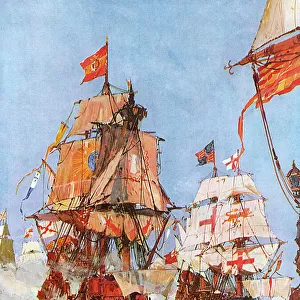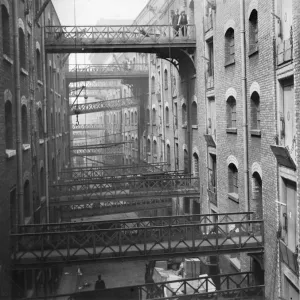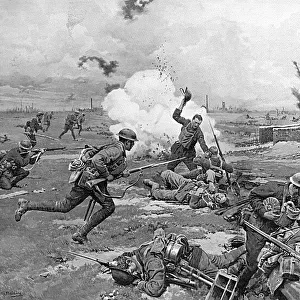Home > Europe > United Kingdom > England > London > Transport > Railway
Cook and Wheatstones 5-needle telegraph, 1837 (1915)
![]()

Wall Art and Photo Gifts from Heritage Images
Cook and Wheatstones 5-needle telegraph, 1837 (1915)
Cook and Wheatstones 5-needle telegraph, 1837 (1915). The 5-needle telegraph was the first successful electric telecommunication device and was patented by Charles Wheatstone and William Cooke. It first saw service on the newly-developing railways, and by 1838 the telegraph was sending public telegrams as well as Great Western Railway messages between London and West Drayton, a village 21km (13 miles) to the west. Cigarette card
Heritage Images features heritage image collections
Media ID 14864089
© Oxford Science Archive / Heritage-Images
Charles Wheatstone Cooke Industrial Revolution Innovation Invention Oxford Science Archive Sir Charles Sir Charles Wheatstone Telecommunication Telecommunications Telegram Telegraph Telegraphy Wheatstone
FEATURES IN THESE COLLECTIONS
> Arts
> Artists
> W
> Charles Wheatstone
> Europe
> United Kingdom
> England
> London
> Transport
> Railway
EDITORS COMMENTS
This print showcases Cook and Wheatstone's groundbreaking 5-needle telegraph, a remarkable invention that revolutionized communication in the 19th century. Patented by Charles Wheatstone and William Cooke, this electric telecommunication device marked a significant milestone in the history of technology. Initially employed on railways, this innovative telegraph quickly expanded its reach. By 1838, it was not only transmitting messages for Great Western Railway but also facilitating public telegrams between London and West Drayton, a village located approximately 21km (13 miles) to the west. The image captures the essence of an era defined by concept, innovation, and industrial revolution. The vibrant colors bring life to this historical artifact from the Oxford Science Archive collection. It serves as a reminder of Britain's pioneering role in scientific advancements during the 19th century. Sir Charles Wheatstone and Sir William Fothergill Cooke were instrumental figures behind this extraordinary creation. Their collaboration paved the way for future developments in telecommunications that would shape our modern world. As we gaze upon this print collector's treasure, we are transported back to a time when science and invention propelled humanity forward. This photograph encapsulates not just a technological marvel but also represents an important chapter in British history - one that forever changed how we communicate across vast distances.
MADE IN THE USA
Safe Shipping with 30 Day Money Back Guarantee
FREE PERSONALISATION*
We are proud to offer a range of customisation features including Personalised Captions, Color Filters and Picture Zoom Tools
SECURE PAYMENTS
We happily accept a wide range of payment options so you can pay for the things you need in the way that is most convenient for you
* Options may vary by product and licensing agreement. Zoomed Pictures can be adjusted in the Cart.






